Subscribe to Zero-Sum Pfear & Loathing


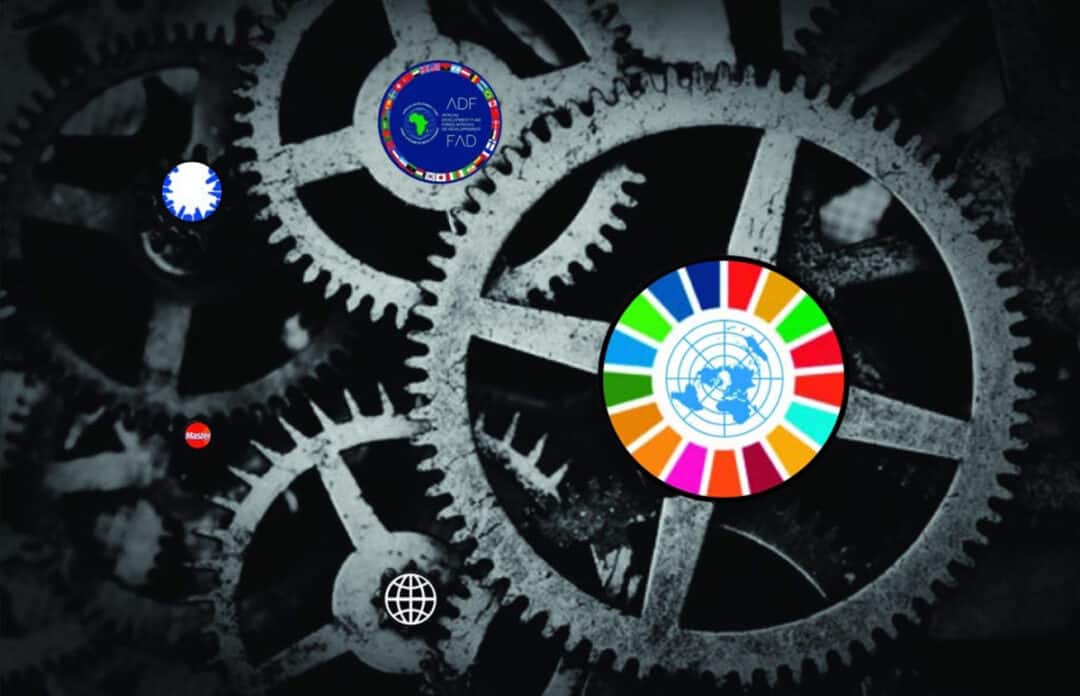
by Paul Cudenec | Aug 15, 2023
It is only in the last year or two that I have grasped the reality that our world today is literally ruled by one single corrupt financial-industrial-military institutional entity, the thing that I have now taken to calling the criminocracy.
Thanks to my research and reading, I am now absolutely certain that this is so, but I know that it is a picture that can seem exaggerated and outlandish to many.
Even some fellow dissidents still imagine that Russia and China remain outside of the Rothschild-led global banking system, for instance, and thus welcome the emergence of the BRICS hegemony.
Like me, they applaud African impatience with Western neocolonialism, but without fearing, as I do, that all the talk of self-determination is just cover for a transfer of imperialist “development” of the continent and its people into the hands of the new “multi-polar” world order.
The other day, I happened across an intriguing social media post from a business in Rwanda, East Africa.
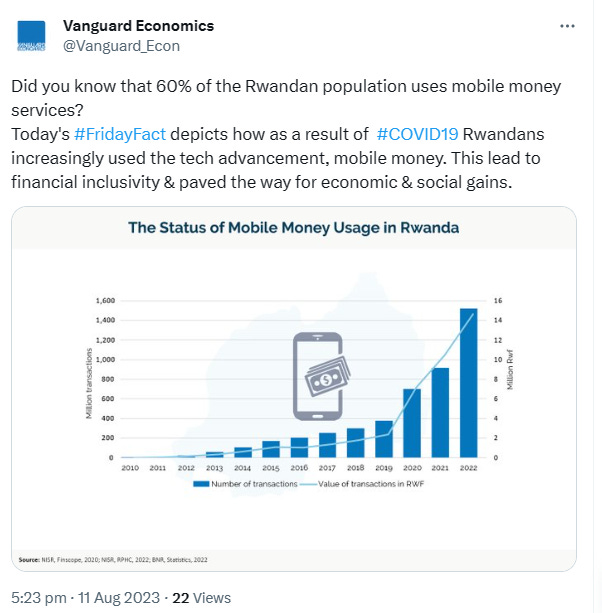
This stated: “Did you know that 60% of the Rwandan population uses mobile money services? Today’s #FridayFact depicts how as a result of #COVID19 Rwandans increasingly used the tech advancement, mobile money. This lead [sic] to financial inclusivity & paved the way for economic & social gains”.
Well, that’s pretty telling in three different ways, I thought to myself.
Firstly, they are pretty much confirming the “conspiracy theory” that Covid was not a real pandemic, but just a means to boost an agenda featuring “tech advancement”.
Secondly, the use of the term “financial inclusivity” to describe the use of mobile money services shows the real meaning of the buzz word “inclusivity”, which pretends to be all about helping and loving every single person on the planet.
And finally, there is that admission that all this “paved the way for economic & social gains”. Needless to say, the recipients of these “gains” are not actually identified…
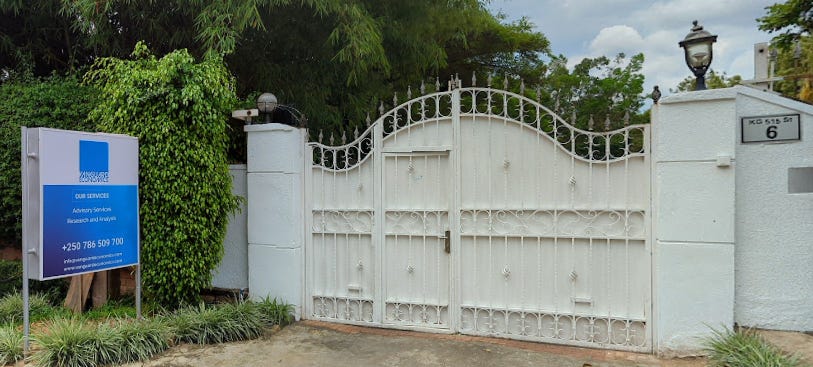
The name of the business behind this statement was Vanguard Economics Ltd (office entrance pictured here), which I assumed had to be part of the global Vanguard-BlackRock empire headed by the Rothschild Gang.
But it only describes itself on its website as a “boutique research and advisory firm based in Kigali, Rwanda” even though I later discovered that it is registered in the USA as an “International Organization”.
It also boasts: “We understand the context. We can mobilise rapidly. We have the networks. We can reach a large number of stakeholders rapidly”.
This all seems a bit odd for a “boutique” local African business…
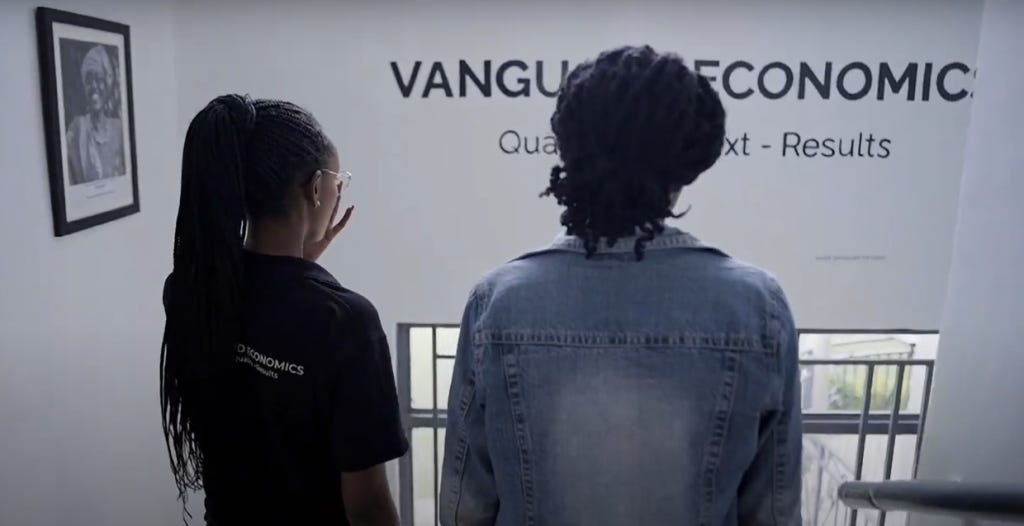
Created in 2015, Vanguard Economics Ltd insists that it “delivers top-tier research, advisory and implementation services for Africa from within Africa”.
Its vision is of “a future where populations shape their own destiny” – very much playing the anti-imperial self-determination card – and its mission is to “identify, design and implement homegrown solutions to the challenges populations face on their path to sustainable and inclusive prosperity”.
Sustainable and inclusive prosperity – a phrase which really makes my skin crawl!
It adds: “Our work is focused on maximising the impact private sector development, trade & logistics, and the commercialisation of agriculture can have on delivering transformation for markets and populations across Africa”.
Maximising the impact of private sector development, commercialising agriculture and “delivering transformation” of African peoples?
Isn’t there a slight contradiction here with the notion of “a future where populations shape their own destiny”?
It turns out that Vanguard Economics Ltd’s idea of letting Africans decide their own fate is to recruit them to work for their international financial project and pretend it is all a home-grown initiative.
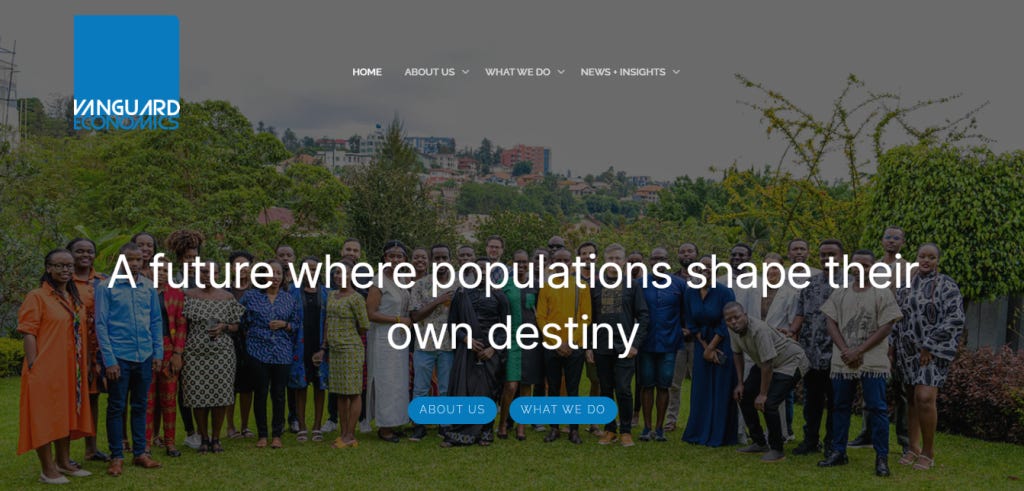
It pursues policies “designed to nurture the next generation of Rwandan thinkers and leaders” and says that it was founded on the understanding that “social change is not a project that one group of people carries out for the benefit of another”.
Rather for the benefit of themselves, while only pretending to do so for the benefit of the other, perhaps?
The reality of Vanguard Economics Ltd’s interest in Rwanda is made clear by the way that it regards young people, who make up over 60% of the total population, as “valuable resources for the country’s development” – as human capital, in other words.
Vanguard Economics says it “specializes in quantitative and qualitative data collection for development in East Africa” and in “impact modelling and assessments for development partners”.
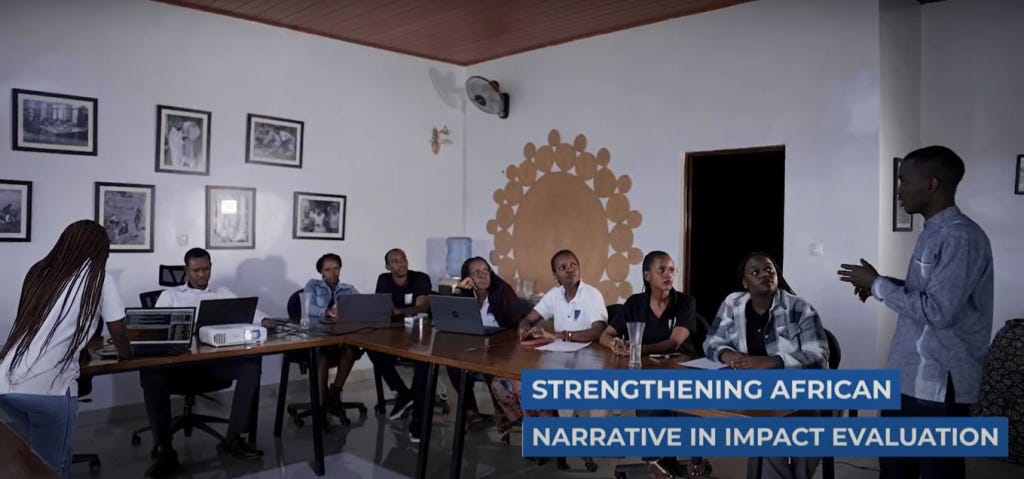
What this means is that it hopes to milk the financial value of Rwandan youth, for its own benefit, via impact capitalism, the public-private digital slavery system which lies at the heart of the global mafia’s “sustainable development” agenda.
In 2023 it launched the new Vanguard Economics Young Impact Associate scheme, a “paid fellowship focused on laying the foundations for a successful career in the field of Monitoring, Evaluation and Learning (MEL)”.
This “aims to create 30 million dignified and fulfilling jobs for young people in Africa by 2030″.
It is funded by, and implemented in partnership with, the Mastercard Foundation, a Canada-based organisation currently targeting Africa through its Young Africa Works scheme and which liaises closely with the United Nations Sustainable Development Group.
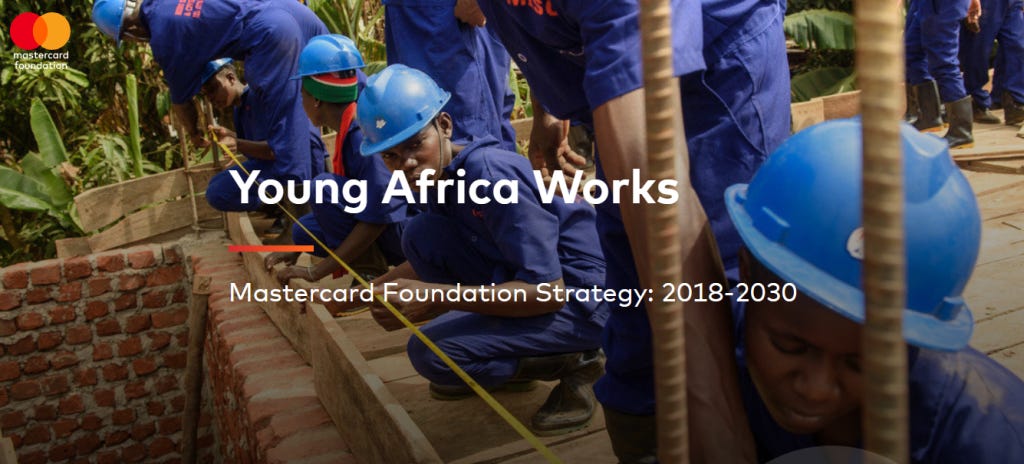
As its name suggests, the Foundation was set up by the global financial corporation Mastercard.
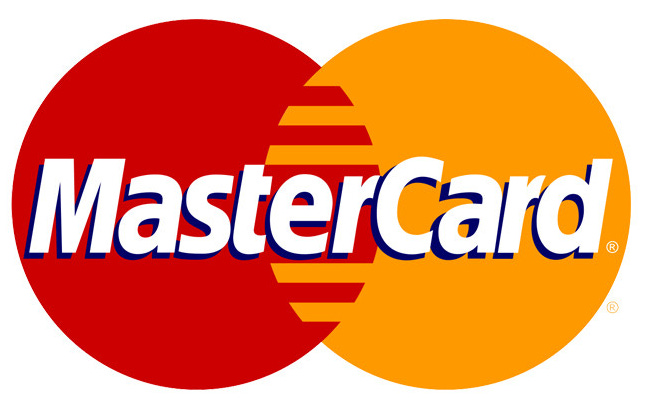
But don’t let that make you imagine that it is not motivated by the finest of philanthropic principles!
Describing itself as “a funder, a convenor, and a catalyst for change in Africa”, it declares: “The young people of Africa will determine their future. They are leading the way. With the right planning and policies, they will transform a vibrant continent into a powerhouse for global prosperity”.
Being put to work to provide a major new source of prosperity for the global money-power? Is that really the future of which young Africans dream?
The Young Impact Associate scheme is not only being rolled out in Rwanda, with Vanguard Economics, but also in Senegal, Ghana, Nigeria, Ethiopia, Uganda and Kenya.
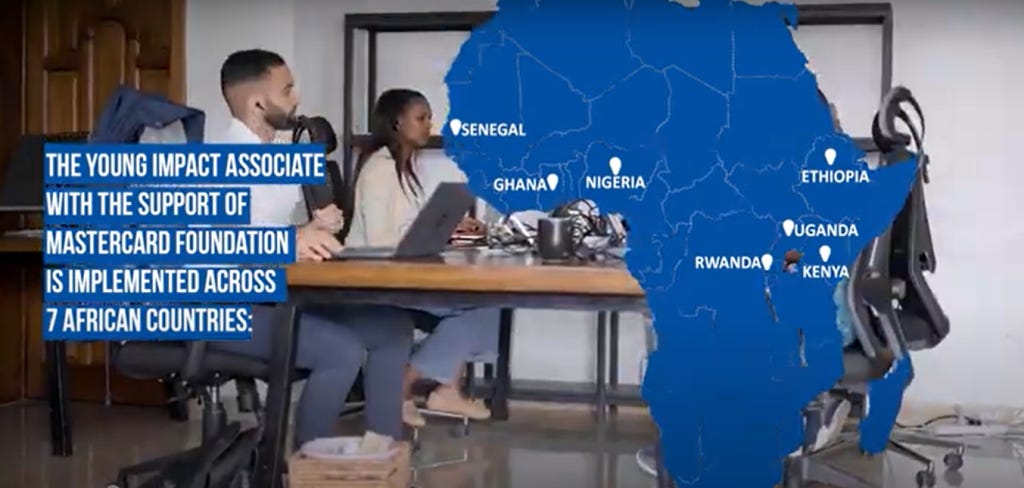
In Nigeria, one of the other organisations involved is an outfit called Global Integrity, based in Washington DC, USA, which “connects frontline actors and global players to help them navigate complex governance challenges with a systems change mindset”.
A keen “partner” of Vanguard Economics in its recruitment efforts is a firm called Bridge2Rwanda or The Bridge 2 Talent.
This was founded in 2007 “to accelerate Rwanda’s growth by encouraging global direct investment”.
It says of its database of professionals: “This pipeline of talent is the key to achieving Rwanda’s ambitious Vision 2050 and establishing the country as [a] market-driven, middle-class economy and model for all of Africa”.
Under the heading “Accelerating Rwanda’s Economy”, it adds: “The BRIDGE is committed to ensuring that global investors have the resources and talent they need to achieve their long-term, strategic goals”.
You can’t get clearer than that!
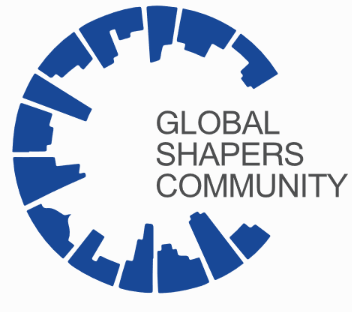
I was interested to note that one member of The Bridge’s team, Vanessa Nkesha, is also vice-curator of the Kigali hub of Klaus Schwab’s Young Global Shapers, the WEF’s worldwide “youth” organisation which I wrote about in 2021.
Vanguard Economics Ltd is listed as “privately held” so it’s not easy to prove who is ultimately behind it.
It was founded by the not-very-African Mads Knudsen, (pictured) who formerly worked in the World Bank and Development Section of the Danish Embassy in Washington, DC, and for the Department for UN and Global Development in Denmark’s Ministry of Foreign Affairs and was once a board member of Oikos Bank.

And managing director Kato Kimbugwe previously worked as a “private sector development advisor” for the UK’s Department for International Development, “helping to deliver private sector development and growth objectives in the British Overseas Territories”.
However, while its direct ownership may be hidden from public view, the firm’s list of 23 “partners and collaborators” not only gives us a clear indication of its allegiances, but also helps us identify some of the cogs that make up the corrupt contemporary machine of global greed and control.
These organisations are:
UNDP. The United Nations Development Programme, which “plays a critical role in helping countries achieve the Sustainable Development Goals”. Its Strategic Plan 2022-2025 promises “solutions for greater impact”, adding: “Powerful enablers – strategic innovation, digitalization and development finance – will further accelerate and scale results”.
UNECA. The United Nations Economic Commission for Africa says it wants to “achieve accelerated job creation, sustained economic growth and prosperity through leveraging the role and resources of the private sector, promoting innovative financing solutions and creating the environment in which private sector investments for agribusiness, energy, infrastructure, and other sectors can become viable”.
IFC. International Finance Corporation, part of the World Bank Group. It says: “As pioneers in impact investing, we fuel growth where it’s needed most. Our strategic capital empowers visionary entrepreneurs to bring sustainable solutions to scale”.

Trade Mark East Africa. Funded by the development agencies of Belgium, Canada, Denmark, Finland, Netherlands, Norway, UK, and the USA, it “seeks to increase trade by unlocking economic potential anchored on 2 key outcomes: reduced barriers to trade and improving business competitiveness”.
Development Bank of Rwanda. “Maximazing the development impact“, as it puts it, it is facilitating the emergence of a “vibrant private sector” under the “guidance” of the National Bank of Rwanda, which is believed by researchers to be owned and controlled by the Rothschilds.
Sida. Sweden’s government agency for “development cooperation” says it invests in “sustainable development for all people”. It collaborates with several organisations and “a large part of the support goes to various UN agencies and the World Bank”.
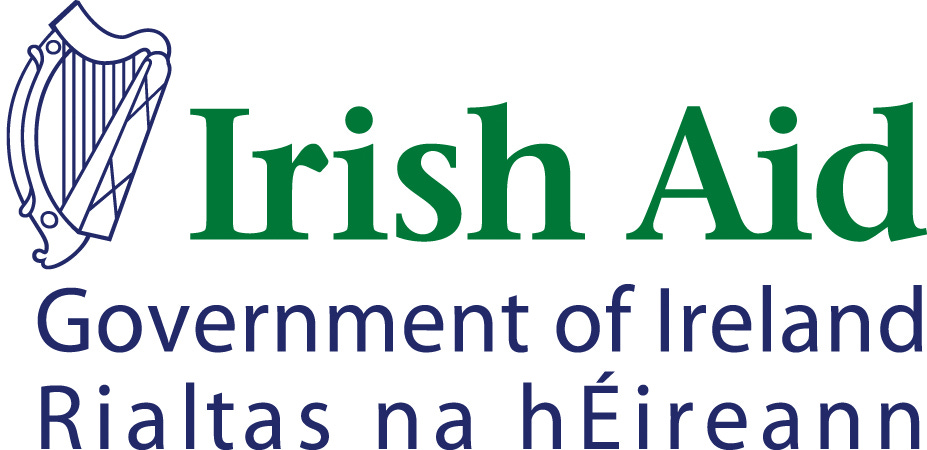
Irish Aid. Boasts that Ireland has an “expanding development cooperation programme” which has “a particular focus on sub-Saharan Africa”. It adds: “The private sector is increasingly playing a key role in achieving development outcomes”.
Institute of development studies. An “independent charity” based at the University of Sussex, UK, it says: “Through equitable and sustainable partnerships, we work with governments, philanthropic foundations, non-governmental organisations, academics and civil society to transform approaches to progressive social, political and economic change”. Its “impact” includes “long-term development” and “economic growth” in Rwanda.
Access to Finance Rwanda. Set up in 2010 by the UK and Rwandan governments, it is also funded by the Mastercard Foundation, Sweden and Jersey Overseas Aid. “AFR’s strategic focus is stimulating the financial sector development by partnering with financial institutions and other stakeholders to increase access to and use of quality financial services”. It is part of the FSD network, “a family of Financial Sector Deepening programmes” seeking “inclusive growth” in Africa, “guided by the imperatives of the United Nations’ Sustainable Development Goals”. FSD funders include the Bill & Melinda Gates Foundation.
GIZ. Deutsche Gesellschaft für Internationale Zusammenarbeit GmbH. “We are guided by the principles of our social order, act in the interests of Germany and, first and foremost, support the development policy of the German Government”. In Rwanda GIZ “provides advice on developing the local pharmaceuticals industry, including the production of vaccines”.
Oxfam. International charity, posing as corporate-critical, which urges “lifesaving aid” to Africa because of “the impact of the war in Ukraine on global food systems”. Its line on Covid: “To end this pandemic, we need a vaccine that is free, fair, and available to all. We need a People’s Vaccine”.
RTI International. A US-based “independent” research institute dedicated to “improving the human condition” by means of “science-based solutions”, insisting that “AI enhances our capabilities and services”. A member of the Global Health Security Agenda Consortium Steering Committee, it says: “Our high-impact, life-saving responses range from strengthening surveillance and health information systems for rapid detection of infectious diseases to supporting vaccine roll-out”.
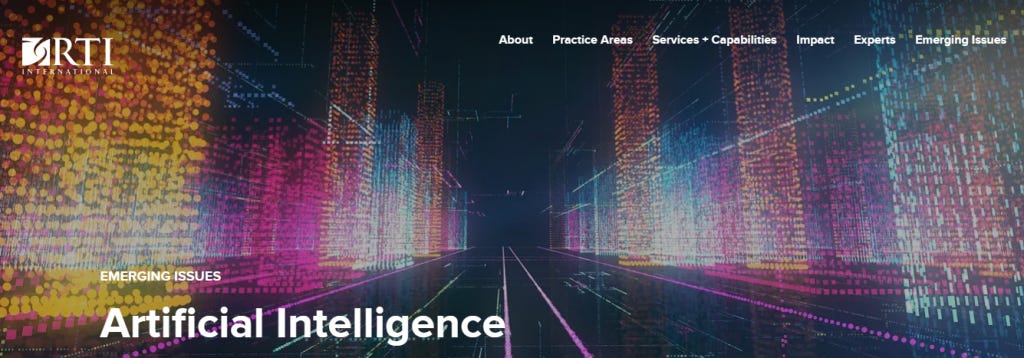
Enabel. The development agency of Belgium’s federal government, it seeks “a sustainable world where all live under the rule of law” and focuses on “digital governance”, such as “digital civil registries and digital identity”.
GSMA. Global System for Mobile Communications Association, an organisation which “represents the interests of mobile network operators worldwide” and advances the UNSDGs by “accelerating innovation in digital technology”.
Nathan. Economic consulting firm with International Development offices in Arlington, Virginia and London, UK. It is now part of Cadmus, a global business with “drive for impact” which aims to “leverage transformative technologies” via more than 1,000 worldwide “consultants”.
spark. A Dutch-based “independent” international development organisation, which wants to create “impactful jobs” for youth and “boost entrepreneurial ecosystems”. Its Strategy 2030 is “aligned with the UN Sustainable Development Goals”. Of course!
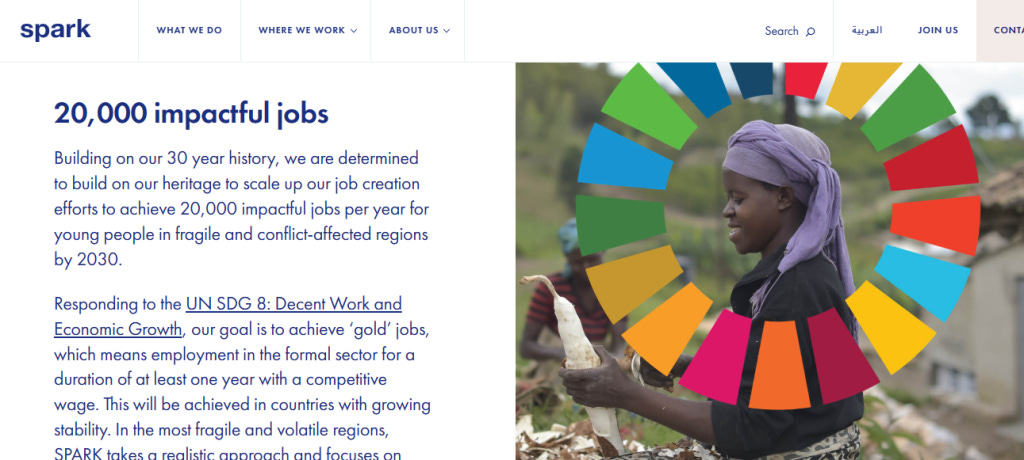
USAID. Declares itself to be “the world’s premier international development agency and a catalytic actor driving development results”, whose work advances “U.S. national security and economic prosperity” and, apparently, “demonstrates American generosity”.
World Food Programme. An executive member of the UN Sustainable Development Group, a consortium of UN entities that aims to fulfil the UNSDGs. Since 1992, all executive directors have been American.
World Vision. An international US-based “Christian humanitarian organization” supporting “transformational development“. Boasting that it is The World Food Programme’s “largest food distribution partner”, it aims to make “a life-saving impact” (that word again!).
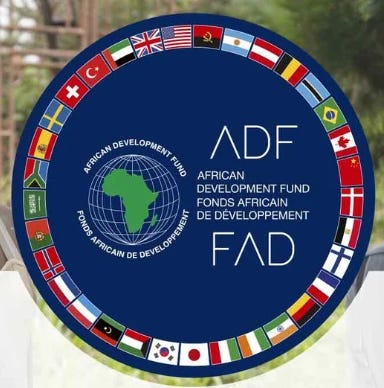
African Development Fund. The concessional window of the African Development Bank Group, “at the center of Africa’s transformation“. On Monday August 14, 2023, The Financial Times revealed that the ADB’s $55m “anti-corruption” fund had been unused for seven years and it had failed to deploy any of the money reserved to fight graft on the continent. The report adds that this “could raise questions about the efficiency of an institution through which western governments channel billions of dollars to development projects”.
Message House. A UK-based “research and communications consultancy” whose mission is to use “smart insight” for “narrative development”. Clients include the Tony Blair Institute for Global Change. Founder and managing director Matt Carter was, as secretary general of the UK’s Labour Party, involved in the Cash for Honours scandal, and was UK CEO of Burson Marseller (now Burson Cohn & Wolfe), a PR firm notorious for supporting the chemicals industry and whose main institutional shareholders include two sections of Vanguard, the global entity whose relationship to Message House “partner” Vanguard Economics Ltd remains obscure!
Rockefeller Foundation. US “philanthropic” entity which says it is “making big bets that promote the well-being of humanity in the 21st century” and “channeling private capital toward deep social impact”. It seeks “more inclusive global growth” and “long-term investment prospects” by taking “pioneering risk through catalytic capital investments”. It gave more than $400,000 to Vanguard Economics Ltd in Rwanda in 2020 and another $100,000 in 2021.
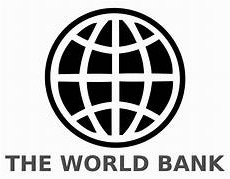
World Bank. Very interested in “human capital” and in “human capital-led economic growth in Africa“. A typical agenda item at its July 2023 summit in Tanzania was: “Africa’s prosperity depends on youthful demographics. How can Africa utilize its young population fully to achieve Agenda 2063?”
We can see quite plainly here how the UNSDGs form the basis of a long-term global development “structure plan”, aimed at accelerating industrialisation and control, not least in Africa, whose land and peoples are seen as being ripe for exploitation by financial imperialists.
The “good causes” championed by the UNSDGs really represent industrial-financial sectors, whose profit-seeking efforts are aided and abetted by global institutions and national governments dedicated to promoting this virtue-signalling agenda.
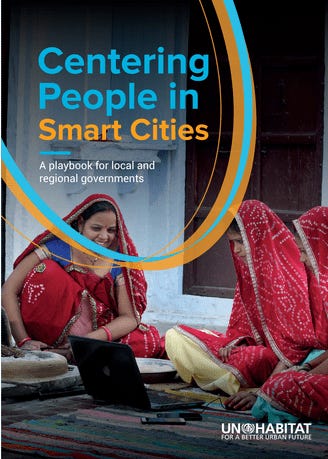
Public money supposedly deployed to “fight poverty” or “save the planet” is in fact being used to build a nightmarish “smart” world, an all-inclusive digital slave-labour camp in which both human and natural capital are sources of sustainable enrichment and power for the global parasites.
One single multi-faceted self-concealing worldwide public-private empire is behind this vile agenda.
Its power is great and its pockets deep, but its core movers are few and in order to succeed they need to hide their corrupt monopoly from the rest of us behind a convincing do-gooding facade.
Since 2020, many cracks have been appearing in this facade.
As writer and commentator Neil Oliver asked on the same day as Vanguard Economics Ltd issued the post that prompted this article: “When enough people realise they’ve been had, all their lives, by corrupt, lying, politicians and captured institutions bought and paid for by criminal, unelected, unaccountable transnational entities… what then?”
This article features in the latest Acorn bulletin at winteroak.org.uk